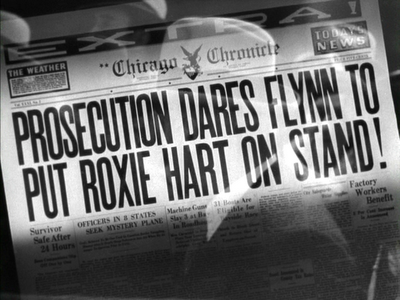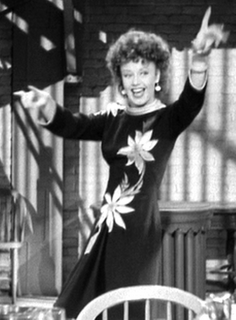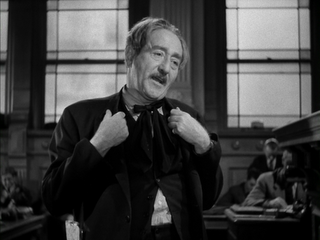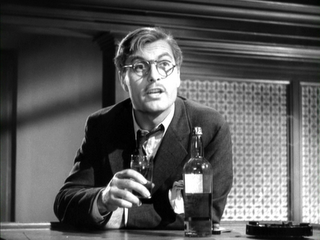Thursday, November 02, 2006
The name on everybody's lips...

By Edward Copeland
is going to be ... Roxie — or so goes the song in the Kander & Ebb/Bob Fosse Broadway musical turned Oscar-winning best picture Chicago. However, the story of "Roxie Hart," loosely based on a real 1924 murder trial of a woman named Beulah Annan, first began its fictional life as a play called Chicago before Wild Bill Wellman directed Ginger Rogers in a 1942 adaptation called Roxie Hart.

The movie, until the very end, bears striking similarities in tone and character to what eventually became the musical Chicago in 1975. While all the characters, like Roxie, are fictional pseudonyms, most of the characters will be familiar to viewers of the Broadway musical or the 2002 movie version. There's an Amos Hart (George Chandler in this case), a "Mama" Morton (Sara Algood, though the role is nowhere as pronounced as in the musical), a Mary Sunshine (Spring Byington) and a Billy Flynn (Adolphe Menjou). The murder victim even bears the same name of Fred Casely. The only notable absence: No Velma Kelly to be found. Roxie Hart tells its story in flashback as a reporter named Homer Howard (George Montgomery) recounts the case to a bar full of eager listeners 15 years after the event. Before the film even begins, a tongue-in-cheek title card dedicates the film to "all those women who filled their men full of holes in a fit of pique." Homer was a rookie reporter when the Roxie case happened and he found himself attracted to the vivacious murder defendant, though as he recounts the tale he's now a hard-drinking journalist — because that's what the public expects of reporters, he says. He also laments that Chicago hasn't had any good murder tales like Roxie's since "the Democrats took over."

For moviegoers who only know Ginger Rogers from her classy dancing with Fred Astaire or maybe her noble Kitty Foyle, Roxie Hart is a gum-chomping, entertaining breath of fresh air from the actress. As I said previously, it is interesting how closely the outlines for the Chicago most viewers are familiar with now are clearly laid out in this film. Amos remains a milquetoast sap. Billy Flynn, though older in the form of Menjou, is nearly as manipulative, even if he lacks the razzle dazzle of the musical takes on the character. When he gets to court, he does put on the show and it's an entertaining farce, especially with the solid cast (including a small role by Phil Silvers as a newspaper photographer).

Pre-I Love Lucy William Frawley not only plays the barkeep that Homer shares his tale with, he turns out to be one of the jurors who heard Roxie's case. My good friend Josh R warned that the ending of Roxie Hart might be a disappointment, having to conform to the strict production codes of the day, but it didn't play that poorly for me. No, it's not the same cynical ending of the musical, but it is cynical in its own way, implying that Roxie ended up in a different sort of prison. All told though, Roxie Hart proves an entertaining film with a truly fun performance by Ginger Rogers. If you liked the movie or musical Chicago (or if you didn't), Roxie Hart is a fascinating artifact.
Tweet
Labels: 40s, Astaire, Ebb, Fosse, Ginger Rogers, Kander, Menjou, Musicals, Phil Silvers, Wellman
Comments:
<< Home
Roxie Hart represents what is easilly one of Ginger Rogers' best screen performances - I would place it second only to her work in Stage Door. Between Roxie and Billy Wilder's The Major and the Minor (in which she is not quite as good, but still a delight), 1942 may serve as a career high water mark for the actress.
Post a Comment
<< Home

